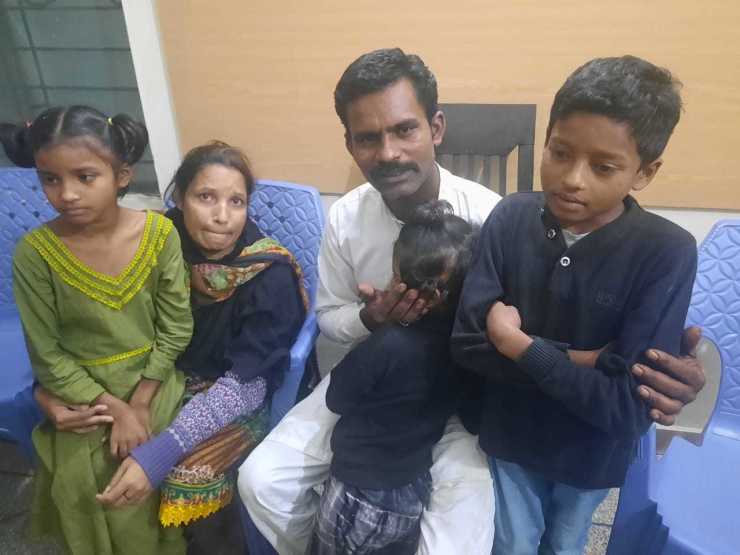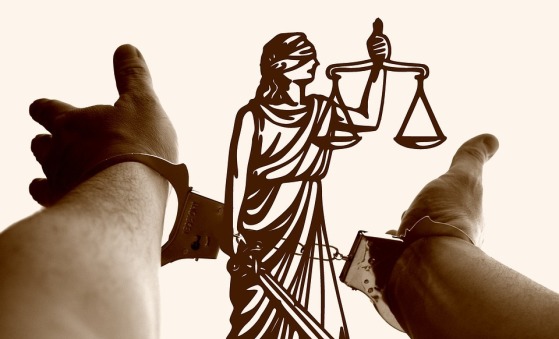
A Christian couple, who had been detained for over a month in Pakistan, were released on bail on 21 October 2023. Their three young children were left without a reliable caretaker as a result of their parents' imprisonment.
The couple was arrested on September 8 under the country’s blasphemy law, specifically under the Pakistan Penal Code Section 295-B, following a complaint from an unfamiliar Muslim individual.
Advocate Riaz Anjum, representing the couple, remarked, "It was a landmark and historic judgement to obtain bail from the Sessions Court in such a short duration for a blasphemy case."
A team of three High Court advocates, including Advocate Riaz Anjum, Advocate Zahid Nazir and Advocate Tahir Bashir, presented the case. Advocate Riaz Anjum led the arguments in the Sessions court before Additional Sessions Judge Mian Shahid Javed in Lahore.
Kiran Shoukat and her husband Shoukat Masih were apprehended by police from the North Cantt police station in Lahore, from their rented residence in Chaudhary Colony. An FIR (First Information Report) was registered under FIR No. 3862/23 at the complaint of Muhammad Taimur, pertaining to the "Defiling, etc., of Quran," which, if proven, could lead to life imprisonment.
Taimur in his complaint stated that around quarter past midnight, he was in the said street purchasing barbeque when he noticed some pieces of papers flying towards the ground from the roof of a house.
After checking the papers, Taimur alleged that they were torn pieces from the Holy Quran.
Taimur and an associate knocked at the door of the house from where these papers were falling. The door was immediately answered by Kiran Bibi.
Kiran, who works in a house as a domestic help, told Christian Today that she and her husband were both at work at different locations, and she had just reached home a minute ago when she heard the knock at her door.
“I had just reached my house and had not even taken the stairs to go to my children on the second floor (where we live), when I heard a knock at the door. And he shared about the piece of papers of the Holy Quran falling from my roof and they wanted to go upstairs and check. I allowed them to inspect whatever they were searching for,” she narrated.
Kiran also told Taimur that her minor children - daughter Sundas, 7, Rubi, 4 and son Sabir 11-year-old might have thrown them from the roof.
The couple’s oldest son is mentally challenged, and the 7-year-old daughter is physically challenged with some issues with her eyes.
Taimur found a pink school bag lying behind the water tank on the roof which contained more torn pages. He immediately dialled the police emergency number (15) and called for the police.
Shoukat Masih, Kiran’s husband who reached home sometime later was also arrested along with Kiran and their children were also taken to the police station.
“Within one day the police finished their investigation and the couple was sent to two different prisons,” said Adv. Anjum.
Kiran was sent to the Central jail and Shoukat was sent to Camp jail (also known as District Jail, Lahore).
Though Assistant District Public Prosecutor (ADPP) Ayesha Tufail firmly opposed the bail plea, the bail was granted on October 18, enabling their release from jail on October 21.
Ground for Bail
Explaining the facts of the case, Adv. Anjum told Christian Today that the complainant in this case nowhere mentions in the FIR that he saw someone tearing the Quran pages or throwing them from the roof.
There were no witnesses either who saw the defiling of the Quran pages or desecrating or someone throwing them from the roof.
There is a great contradiction that the complainant explicitly mentions in his complaint that the pages flying down from Kiran’s roof were torn pages from the Quran. But the investigation of the police said that the torn pages were a part of a 9th grade Islamic studies book, said Adv. Anjum.
Adv. Anjum narrated to Christian Today the grounds on which he argued for bail:
“We presented the case as a case of ‘no evidence’ – because the case has a double version, so it is a case of ‘further enquiry’. Therefore, the ‘benefit of doubt’ should go in favour of the accused, which is the basic principle of law,” said Adv. Anjum who led the argument in the court.
Talking explicitly about the importance of this case, which is historic, the advocate said, to obtain bail from the Sessions Court in such a short duration for a blasphemy case has not been seen in the past, and when bail hearings take place at the Session’s Court, extremist elements usually influence the court, but it was not so in this case, said the lawyer.
Adv. Anjum, praising the brave judgement of Judge Mian Shahid Javed said, “He gave the judgement explicitly on merit, and did not allow any kind of pressure from either parties that could influence his decision.”
Talking about threats in such high-profile cases of blasphemy, there are always risks involved.
“When a blasphemy lawyer can be targeted, no one knows,” said Adv. Anjum.
Children’s Custody
The children’s maternal and paternal uncles and aunts refused to take the custody of the children, said Advocate Anjum.
“The TLP (Tehreek-e-Labbaik Pakistan "Here-I-Am Movement Pakistan" - a far-right Islamic extremist political party in Pakistan) were on the streets protesting the Soukat family and that scared the close relatives. The relatives thus refused the police officer to take the custody of the children,” said Adv. Anjum.
Associate lawyer and human rights activist Tarak Barkat took custody of the children from the Station House Officer (SHO) when the children had nowhere to go.
After a week the children were taken by the HARDS organisation – who were also sheltering Soukat’s brothers and other relatives in a secure location.
Sohail Habel, executive director HARDS (Humanitarian Action for Rights & Development Society) and member of Human Rights Commission, Pakistan speaking to Christian Today expressed deep concern for people who are charged under the blasphemy law.
“When blasphemy allegations are put on families, they are no longer safe or secure. They in fact cannot survive independently in the society. The society does not accept them. There are so many such families who are in hiding. They cannot leave their hiding place and walk out freely.
“Mostly, such families relocate – they change their city, district, and many times their names as well. Some of them who get an opportunity, they leave the country and go to a different country to live,” said Habel.




